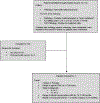Leptomeningeal disease in pancreas ductal adenocarcinoma: A manifestation of longevity
- PMID: 33582005
- PMCID: PMC8611374
- DOI: 10.1016/j.pan.2021.02.003
Leptomeningeal disease in pancreas ductal adenocarcinoma: A manifestation of longevity
Abstract
Background: /Objectives: Pancreatic adenocarcinoma (PDAC) metastatic to the leptomeninges is a rare and lethal event. Leptomeningeal disease (LMD) research is limited in PDAC, and insights into clinical descriptors, possible disease predictors, and treatment strategies is necessitated.
Methods: Memorial Sloan Kettering databases were queried with Institutional Review Board approval to identify patients with LMD and PDAC treated between January 2000 and June 2020. Medical record review was used to abstract clinical, genomic, pathologic, and radiographic data. Overall survival was calculated from date of PDAC diagnosis to date of death. Previously published literature on LMD from PDAC was reviewed.
Results: Four patients with LMD from PDAC were identified, two males and two females. Age at diagnosis ranged from 57 to 68 years. All four patients had predominant lung metastasis and a relatively low burden of intra-abdominal disease. Somatic testing indicated alterations typical of PDAC and no PDAC defining pathogenic germline mutations were identified. An extended clinical course prior to LMD diagnosis was observed in all patients, ranging from 16 to 148 months. Upon diagnosis of LMD, three patients elected for supportive care and one patient received a limited course of craniospinal radiation. The median survival following diagnosis of LMD was 1.6 months (range 0.5-2.8 months).
Conclusions: LMD from PDAC is a rare occurrence that may be more frequent in patients with lung metastasis and/or a more indolent clinical course. Following diagnosis of LMD, prognosis is poor, and survival is short. New treatment strategies for this manifestation of PDAC are needed.
Keywords: Cerebrospinal fluid; Genomics; Leptomeninges; Pancreatic adenocarcinoma.
Copyright © 2021 IAP and EPC. Published by Elsevier B.V. All rights reserved.
Conflict of interest statement
Declaration of competing interest EOR Research Funding to MSK: Genentech/Roche, Celgene/BMS, BioNTech, BioAtla, AstraZeneca, Arcus. EOR Consulting Role: Cytomx Therapeutics (DSMB), Rafael Therapeutics (DSMB), Sobi, Silenseed, Molecular Templates, Boehringer Ingelheim, BioNTech, Ipsen (+spouse), Polaris (+spouse), Merck (+spouse), AstraZeneca (+spouse), Bayer (spouse), Genentech/Roche (spouse), Celgene/BMS (spouse), Eisai (spouse). No other authors have disclosures.
Figures



References
-
- Siegel RL, Miller KD, Jemal A: Cancer statistics, 2018. 2018; 68: 7–30. - PubMed
-
- Beauchesne P: Intrathecal chemotherapy for treatment of leptomeningeal dissemination of metastatic tumours. Lancet Oncol 2010; 11: 871–879. - PubMed
-
- Park KS, Kim M, Park SH, Lee KW: Nervous system involvement by pancreatic cancer. J Neurooncol 2003; 63: 313–316. - PubMed
Publication types
MeSH terms
Grants and funding
LinkOut - more resources
Full Text Sources
Other Literature Sources
Medical

